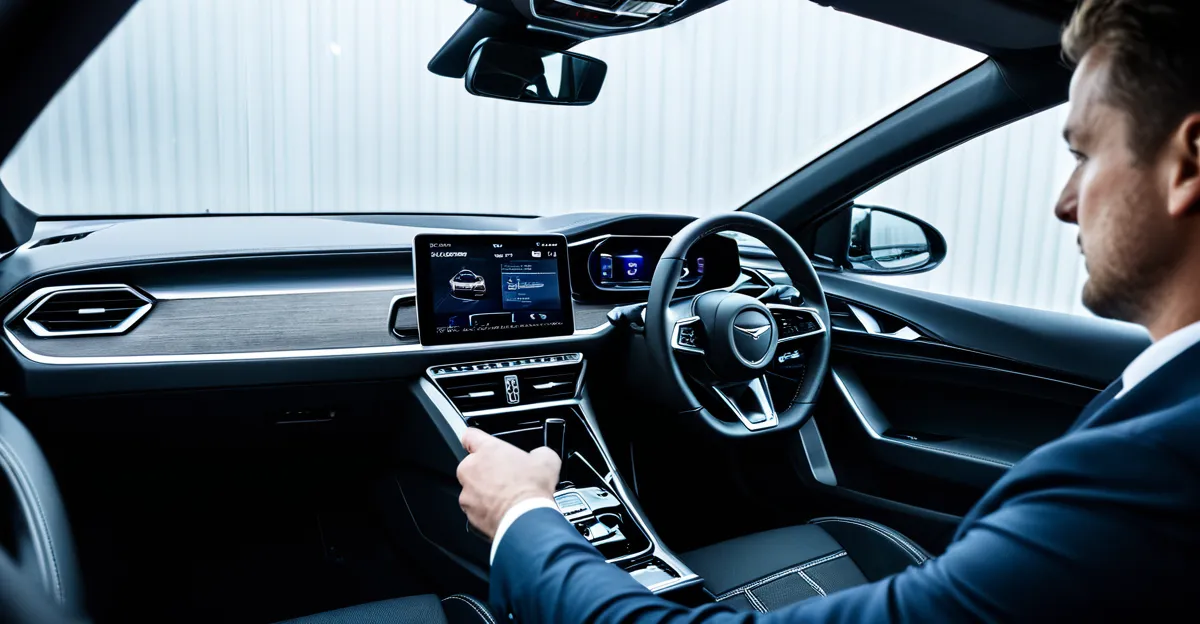Overview of Technological Innovations in the UK Automotive Industry
Technological innovations are reshaping the landscape of the UK automotive industry, encompassing advancements that redefine vehicle conceptions and manufacturing processes. Innovations range from digital connectivity to electrification, enabling quicker, more efficient production lines and fostering smart mobility solutions.
One of the current trends in the UK automotive sector is the shift towards sustainability, driven by both environmental concerns and consumer demand. This includes increased investments in electric vehicles and hybrid technologies, as well as advancements in energy-efficient manufacturing techniques. The sector is also witnessing a surge in the development of autonomous vehicles, supported by innovations in artificial intelligence and machine learning that enhance vehicle safety and efficiency.
Have you seen this : How are UK car brands integrating smart technology into vehicles?
Adapting to these technological changes is crucial for industry stakeholders. Embracing innovation allows automotive businesses to remain competitive, meet stringent regulatory requirements, and align with evolving consumer preferences. Companies must develop agile strategies, focusing on ongoing upskilling and collaboration with tech firms to stay ahead in this rapidly transforming landscape.
Electric Vehicles: Trends and Challenges
The rise of electric vehicles (EVs) in the UK market marks a significant shift in the automotive landscape. Supported by government incentives and robust regulatory frameworks, the transition to EVs is gaining momentum. These initiatives are designed to encourage EV adoption by providing financial benefits and establishing infrastructure, such as charging stations, to support widespread use.
In the same genre : How is the UK automotive market responding to AI-driven consumer demands?
Government incentives play a pivotal role in this transition, offering tax breaks and grants to both consumers and manufacturers. This concerted effort aims to lower the barrier to entry, making electric vehicles more accessible and cost-effective for consumers. Additionally, stringent emissions regulations push manufacturers to innovate and integrate sustainable technologies into their lineups.
However, manufacturers and consumers face several challenges. High production costs and battery limitations are significant hurdles for manufacturers, impacting the affordability and performance of EVs. For consumers, the availability of charging infrastructure and range anxiety remain primary concerns, despite ongoing developments in the sector.
Manufacturers are addressing these issues through research and development aimed at improving battery technology and reducing manufacturing costs. As technology evolves, the expectation is that these challenges will diminish, paving the way for a broader acceptance of electric vehicles and a more sustainable future for the UK automotive industry.
Automation and AI in Automotive Manufacturing
The integration of automation and AI in the UK automotive manufacturing sector is driving significant changes in production processes. By automating repetitive tasks, manufacturers can enhance efficiency and reduce costs. This transformation is marked by the use of robotic arms and AI algorithms for quality control and predictive maintenance.
One key benefit of automation in manufacturing is the ability to operate production lines continuously, thereby increasing output without compromising quality. AI further enhances this by processing large sets of data to identify potential issues before they disrupt the supply chain, minimizing downtime and optimizing resource allocation.
Case studies illustrate successful applications of AI in the industry. For instance, car manufacturers are deploying AI-powered vision systems to detect defects in real-time, ensuring higher quality standards. Another example involves using machine learning to streamline inventory management, effectively balancing supply and demand.
As these technologies continue to evolve, the UK automotive industry is expected to witness more innovations, ultimately leading to a competitive edge in the global market.
Effective Strategies for Stakeholders
The UK automotive industry is undergoing a remarkable transformation, driven by a need for stakeholder strategies that emphasize both collaboration and innovation. This evolution requires manufacturers, suppliers, and tech firms to actively engage in partnerships that harness each other’s strengths. By collaborating, firms can streamline the integration of new technologies, ensuring they meet the market’s dynamic demands.
One key strategy is forming alliances between automotive manufacturers and tech companies. These collaborations lead to the successful development and deployment of innovative solutions, such as connected car systems and autonomous vehicle technologies. For example, partnerships that focus on developing electric and hybrid vehicle platforms benefit both parties by sharing R&D costs and expediting technological advancements.
Moreover, innovation is at the heart of adapting to the frequent shifts the industry faces. Companies that foster a culture of continuous learning and openness to change are more likely to thrive. Implementing agile methodologies allows stakeholders to quickly respond to regulatory changes and consumer preferences, maintaining competitiveness in a fast-paced market.
Examples of successful partnerships are abundant. Collaborative projects, like those seen between car manufacturers and AI firms, have resulted in notable advancements in vehicle safety systems, engine efficiency improvements, and enhanced user experiences. These joint ventures not only prop up individual companies but also strengthen the industry’s overall resilience and innovation capacity.
Regulatory Considerations and Compliance
The UK automotive industry must navigate a complex landscape of regulations that significantly impact technological innovations and their adoption. Existing regulations focus on emissions, safety standards, and the integration of new technologies like electric vehicles (EVs) and automation into the market.
Current Regulatory Landscape
Compliance with stringent emissions regulations is critical for automotive manufacturers. These regulations push manufacturers to develop and integrate more sustainable technologies, aligning product lines with national and EU emission targets. Safety regulations also impose standards that affect the design and functionality of vehicles, necessitating ongoing innovation in safety features and materials.
Future Regulatory Trends
Looking ahead, the landscape is expected to change with a greater emphasis on EV adoption and autonomous vehicle regulation. Policies promoting electric mobility, including charging infrastructure and incentives for hybrid technologies, are anticipated to tighten. These policies aim to bolster the transition to a greener automotive sector.
Compliance Strategies
Automotive businesses must adopt robust compliance strategies to navigate these regulatory challenges. This includes investing in R&D to innovate within regulatory frameworks and liaising with regulatory bodies to stay abreast of changes. Collaboration with tech firms and suppliers can offer more agile responses to compliance issues, ensuring that new technologies meet the required standards seamlessly. As regulations evolve, these strategies will be crucial for maintaining a competitive edge and fostering an environment of sustainable innovation.
Market Impacts and Future Outlook
In the UK automotive sector, technological advancements are paving the way for substantial market shifts. As innovations like electric vehicles, automation, and AI continue to reshape the industry, analysts predict transformative effects on both consumer trends and industrial dynamics.
Predicted Market Shifts
The increasing adoption of electric vehicles (EVs) is set to redefine transportation norms. With government-backed incentives and growing environmental consciousness, the demand for EVs is projected to surge. This shift necessitates enhancements in charging infrastructure and energy grid management, calling for strategic adaptations across the sector.
Long-term Employment and Skills Impact
The technological evolution will also impact the workforce. As automation and AI streamline manufacturing, there is a pressing need for workers to upskill, particularly in areas like data analysis and technical maintenance. This transition offers opportunities for job creation in tech-driven roles but poses challenges for traditional manufacturing positions, underscoring the importance of educational and training initiatives.
Analysts’ Predictions
Market analysts foresee a future where the UK automotive industry is characterized by increased connectivity and sustainability. The integration of smart technologies in vehicles and infrastructure will likely lead to enhanced user experiences and more efficient transport solutions. Overall, maintaining adaptability and embracing innovation are crucial for stakeholders aiming to harness these projected developments, positioning the industry for long-term growth and resilience.









